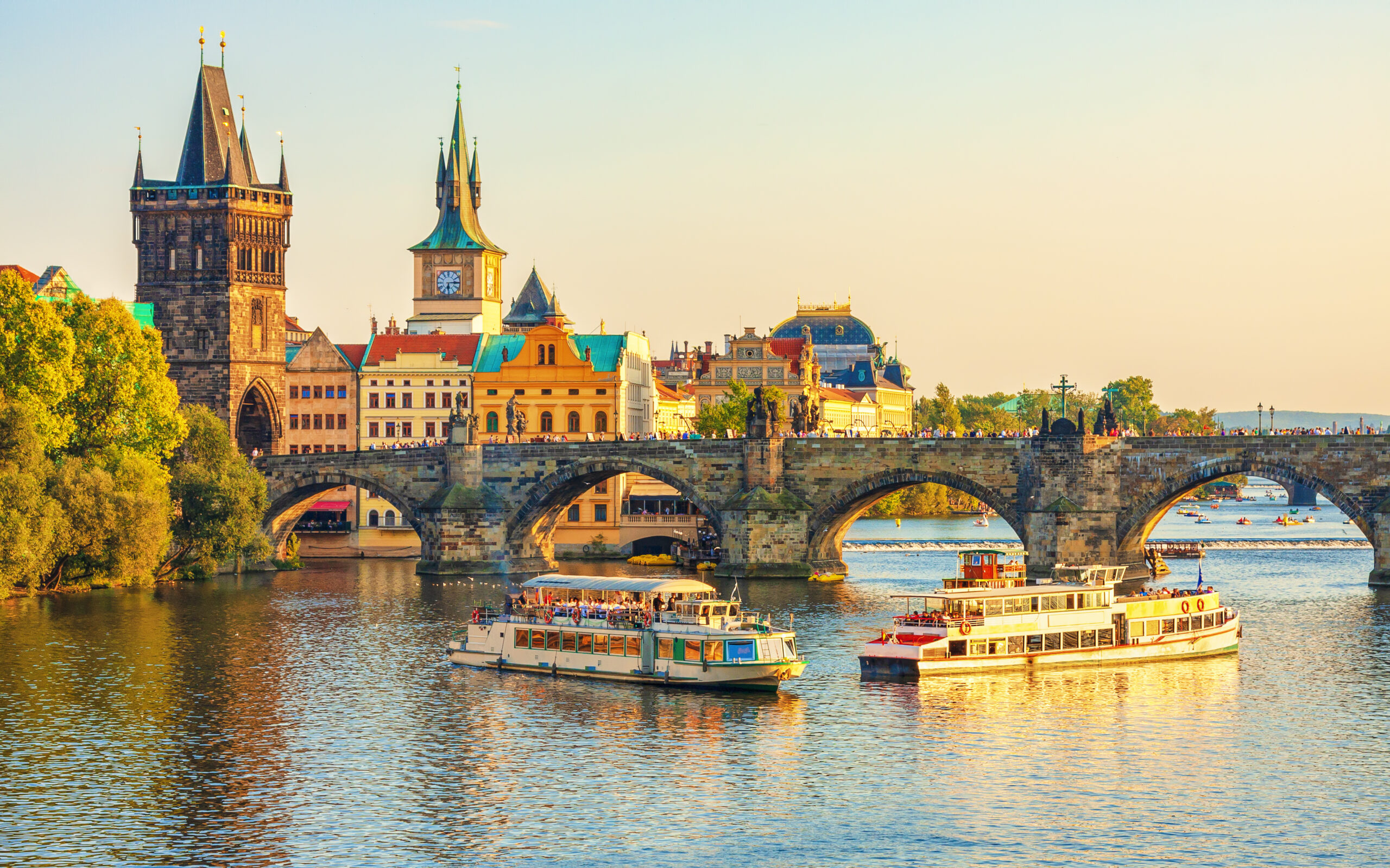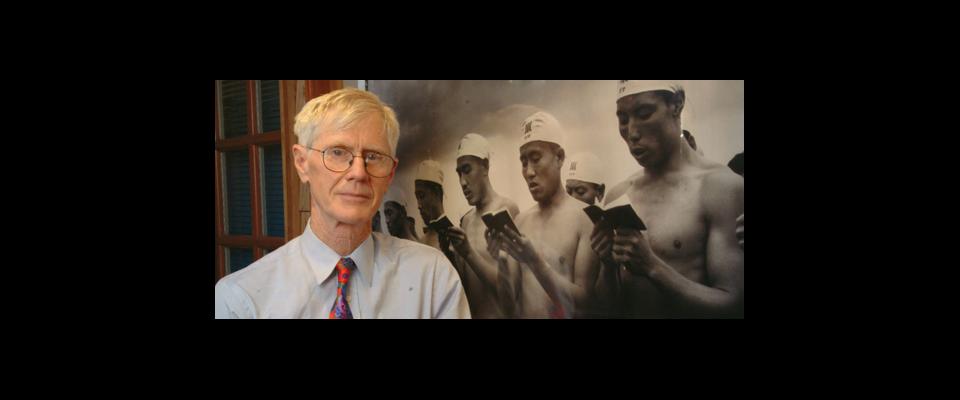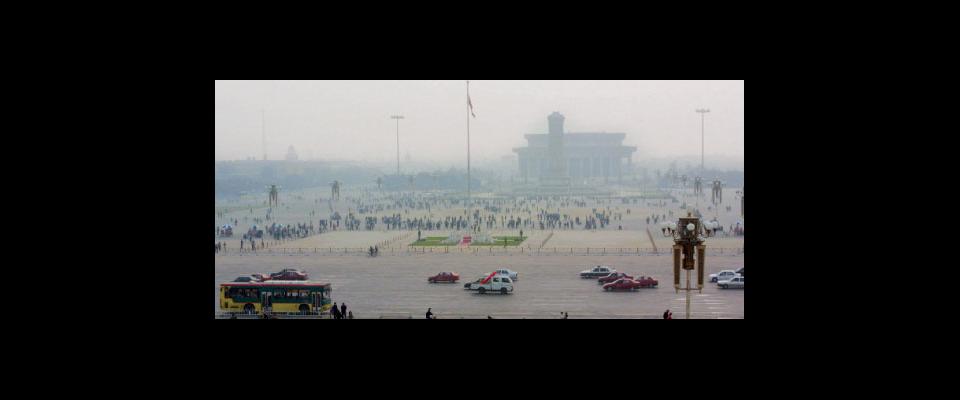An interview with journalism dean and China scholar Orville Schell
For nearly 30 years Orville Schell has been a leading interpreter of Chinese culture and politics, authoring 14 books, including Virtual Tibet, Discos and Democracy, and Mandate of Heaven. Schell, who serves as dean of the Graduate School of Journalism, is now embarking on a Chancellor’s-level initiative to bring scholars from Berkeley and China together to work on environmental issues. In October Schell returned to Beijing for the first time in three years. His wife and two teenage sons will live and study in Beijing during the spring semester.
Q: This was your first trip back to China in three years. What struck you?
Well, China is on an economic tear right now. I don’t think there is any country in history that has undergone such a rapid transformation. I first went to China in 1975 near the end of the Cultural Revolution, when Beijing had only one high-rise building in the whole city. Back then, you’d steer around the city using old landmarks, like temples, walled palaces, and gates from the Old City wall, which had been as wide as Fifth Avenue on top before it was torn down and replaced by a ring road. Now there are five ring roads—like beltways—and they are the new landmarks.
Of the old buildings, the Forbidden City remains a central locus of gravity in the middle of this amazing, sprawling, urban landscape. But the growth has been so fast and so thorough that people get lost in their own city.
Q: Do you think this lack of physical landmarks corresponds to a lack of psychic references to steer by as well?
Yes, this sense of being physically and geographically dislocated is paralleled and compounded by the unique way China’s intellectual sphere has also been deranged by successive waves of revolutionary movements. China is a country that has spent the past 100 years trying to break loose from the gravity identity—something like a new suit of clothing—only to reject it and then have to begin all over. So, there is a very uncertain sense of what it now means to be Chinese.
For millennia, Confucianism provided clear-cut and proper ways of acting toward others. Values were carefully prescribed and ritual behavior meticulously delineated so that people knew their place and how to act out their roles. The whole social/political construct was very tightly wound. But in the early 1900s, this began to be questioned and rejected by a large social protest movement, named the “May 4th Movement.”Under Chiang Kai-shek in the ’20s and ’30s, that model evolved into a pastiche of East and West. And, then, along came Mao and his Marxist revolution. Everything changed radically again—with the premium now placed not on hierarchy but on everyone being equal. “Serving the people” was the great watchword. The West was rejected, and Americans and their “capitalist running dogs” were reviled. Next, Deng Xiaoping and his economic reform movement emphasized a whole different commercial value system, which defied both the Confucian and Maoist systems.
So, one by one, these various new, experimental models in identity and value formation have been cast aside. Now, true north on China’s cultural compass points to unalloyed consumerism. Some people call it “Market Leninism.” The Chinese now feel a great sense of relief to, at last, have a “private” way of getting ahead, and to no longer be deprived of basic comforts. Now there’s this very satisfying new measure of progress in one’s life: “How much money do I have?” But this creates a quite confusing, if liberating, atmosphere. There is a lot of energy and hopefulness, but also a lot of unanswered questions.
The big, “Monty-Python-meaning-of-life” questions are arising with no easy answers: What does China stand for? Who are we Chinese? What should make us proud besides wealth and power, which has long been a large aspiration for China? There is a sense of being somewhat lost. So, you get people following Falun Gong, Christianity, and Tibetan Buddhism. You get a lot of people saying, “All right, I’ve got a car, a few Italian suits, a Gucci handbag, and the family is well fed. Now what?” This is a natural phase, I suppose. But you also have to remember that the Communist Party and the state have suffocated noneconomic aspects of life by not emphasizing or encouraging them, and sometimes by not allowing them. Supporting business, capitalism, and economic growth has become an almost monocultural diet.
Q: What does it mean that the political class has attached itself to increasing GDP and not to some deeper ideology or cultural quest?
China’s GDP has grown over 9 percent per year for the past 10 to 15 years. If this growth rate ever begins to slow down, society would need to rely on things other than economic growth for a sense of promise and stability. At such times, lots of grievances and dissent tend to bubble up from the sharpening inequities. It is then that people need a better-defined political system—some sense of common values and a shared agreement on how you treat people and work things out.
Up to now, and maybe for some time to come, just the promise of getting rich has worked. But we do know that economies are cyclical. It is hard to forget the Silicon Valley IT bubble, Japan’s flameout, and the crash of the Five Dragons [the emerging economies of Asia]. There is always gravity at work in the world, even in economics. What goes up tends to come down.
Q: Is there a tension and danger in rising GDP? In other Asian countries, when GDP rose, people began to demand democratic reforms. I’m thinking of South Korea and Taiwan.
There is certainly that possibility. But it is not inevitable that politically open societies ineluctably follow open economies. In China the verity of developmental theory is being tested on a monumental scale. And it may be that China disproves the notion that an open economy ipso facto leads to an open democratic society.
Q: It seems there are so many risks in China right now that many average people are a bit loath to talk about big political problems.
I think that is true. China confronts a wager: Is it better to start changing politically and hope to thereby release some of the pressure that’s been building up to prevent it from blowing, or is it better to just keep control, knowing that the pressure may build up but hoping you can fortify the containment vessel as much as possible? I think a lot of Chinese feel—and this is the reason there is not more political disturbance—that if political reforms and democracy mean confusion and chaos, they’d rather just forget democracy and, instead, just keep getting rich. Such sentiments are not shared by everyone, but when you raise sensitive political questions in conversation, very often Chinese will just wave them off, saying, “Buyao shuole!” “Don’t bring it up!” meaning, “Let’s just forget it!”
Scholars and developmental theorists tend to assume that economic reform brings political reform, but maybe that’s wrong. Polish dissident Leszek Kolakowski once suggested that the idea of democratic Communism is like “fried snowballs.” Perhaps he’s right, and China is on the road to generating a new and convincing antidemocratic model of development that many will find persuasive precisely because it avoids the messiness of open societies.
I was just at a China conference at Cambridge University in England, where some scholars suggested that while China is, indeed, in a state of uncertain transition, it may almost accidentally have arrived at something of a new model for developing countries, namely authoritarian capitalism. I think that’s an interesting recognition that policymakers have not properly digested.
Q: So, can China make “fried snowballs?”
That is the $1 trillion question. Can China “peacefully evolve,” as many Party officials fear, even though that is probably the best scenario? Or will China hit some developmental wall and fall into chaos? Is it possible in China for such a rigid political structure as a Marxist-Leninist one-party system to change to the point where it is willing to actually countenance its own self-immolation, as in the U.S.S.R.?
Q: One of the binding conditions for growing GDP is the strain it puts on the environment. Could we talk about what’s going on environmentally and how that relates to growth?
There is a direct relationship between China’s booming economy, increased industrialization, and ecological devastation. As China has become the world’s industrial park, its resources are being depleted, and its environment is undeniably being desecrated. By some estimates, illnesses caused by pollution will eat up 15 percent of GDP by 2020. When I was in Beijing two weeks ago, we met with the vice minister of the State Environmental Protection Administration, Pan Yue, and he said it was more polluted that day than any other day in Beijing’s long history. You literally couldn’t see a building three blocks off! It was unbelievable—I’ve never seen air pollution like that.
They’ve closed down the coal plants, so the pollution in Beijing is now mostly coming from auto exhaust. Automobile manufacturing has become one of China’s “pillar industries,” and there is no turning back now. But the environment is finally the inflexible natural edge of China’s developmental envelope. It is also a critical area where the economic miracle merges into a human nightmare. The costs of China’s development on the environment are not only huge but also often irreversible.
Of course, the government is very concerned about this. They’ve got a lot of experimental ideas and good environmental legislation drafted, but the reality is that a 9 percent growth rate inevitably creates exponential levels of resource exploitation and debasement every year. What China cannot do is jeopardize its growth. If it does, people will be put out of work and unrest will ensue. The Party knows this is a slippery slope, possibly leading to the end of its unilateral rule. All too often, when leaders have a choice between environmental protection and growth, they opt for growth. And often they’re making these decisions at the local level, where central control is weakest.
I don’t want to be pessimistic, but, frankly speaking, I don’t see any easy answers to China’s environmental dilemma. And one may be tempted to think that this is not our problem, but the reality is that we’re all in it together.
Q: What is the way forward, then?
The problem is not helped by the fact that our own administration in Washington refuses to fully confront global climate change itself. How can we Americans criticize the Chinese and demand that they take more severe steps in the name of global health, when we ourselves have not stepped up to the plate? During President Bush’s recent trip, there was some discussion of these issues, but nothing very concrete came out of it.
When I was in China this fall, we started discussions for a project between Berkeley and the Chinese Foreign Affairs University, which is attached to the Ministry of Foreign Affairs. The idea is to hold a high-level conference in China next May to look at the whole question of global climate change. At the School of Journalism, we have a yearlong program to report on the social and economic consequences of global climate change around the world. Together with the new Berkeley China Initiative, we will bring together people from the University in the sciences, social sciences, the media, public policy, engineering, etc. We’ll team them up with counterparts in China to have a look at this question. We’re hoping to do something quite new for China: to bring together governmental agencies, academic institutions, universities, think tanks, businesspeople, and possibly some NGOs as well.
Q: Do you think China and California are getting closer? Are we all starting to live in China’s world?
I recently read that 20 to 30 percent of the air pollution in L.A. comes from China. And, insofar as we live in the shopping malls of America—which we do more and more—we are also living in China’s world. China is making an ever-larger number of the things we so wantonly consume.
Everyone in the world is compromised as long as China remains compromised by having a repressive authoritarian government that affords its people a limited amount of democracy, human rights, and due process. But before we get too preachy, we have to recognize that at this particular point in history, America is also compromised. In a way that is painful to recognize, we’ve lost our moral right to judge anybody else. The wars in Afghanistan and Iraq, our response to terrorism, and our attitudes toward the Geneva Convention and our human rights policies at home and abroad have changed the way the world sees and reacts to us.
So, in a certain sense, we have become more like the Chinese. And from the Chinese perspective, it is an interesting moment, because without intending to, we have gained a kind of equivalency. I don’t want to say we are equal by any means to China in terms of commitment to human rights, but because we, too, now have some urgent problems, the discussion can be more equal. That is paradoxically a good place from which to approach China—as a sinner approaches another sinner, with an awareness of mutual fallibility. When you just drill away at China as a second-string member of the axis of evil, they don’t take it very well. But if it’s a common discussion born of an admission that we all have problems, that the world has problems, the Chinese are much more likely to come to the table. That’s why I have a lot of hope for progress when China hosts our collaborative environmental program in the spring.
Q: What should Berkeley’s approach to China be?
China is probably the most interesting and dynamic country in the world today. Berkeley is perched right on the Pacific Ocean, with a large number of Chinese students and a large faculty that works on Chinese issues. Lawrence Berkeley Laboratory has a significant program on China and energy questions. Everywhere you turn on campus, you find someone doing something on China, but nobody knows what anybody else is doing. Sun Yat-sen once said that China was “a dish of loose sand.” Berkeley is sort of like that. All of these projects on China need to be brought together in a coherent way. That’s what the Berkeley China Initiative is seeking to do.
I think it’s very important that, as a public university, Berkeley engage with the world. We need to study Tang dynasty poetry and Ming literature. But we also need to find a way to use the University almost as a global institute to focus on real problems. We have not always done that well.
China is the perfect place to try out this framework for engagement. China is at a tipping point. Indeed, what makes it so interesting is that you can only understand it in terms of contradiction. China could cohere and go onward and upward, or it could fall apart. It could revert to isolationism and anti-Americanism, or it could continue to become more cosmopolitan and internationalist. It could become more militaristic and go to war over some issue like Taiwan, or remain peaceful. It could get into a retributive, nationalistic struggle with Japan, or become a better Pacific partner.
In such an unresolved situation, a university can play an important role in tipping the balance—by identifying those critical areas where China needs people trained, exchanges organized, issues aerated by discussion, or technology transferred. Unlike governments, universities aren’t threatening. Moreover, the Chinese really respect scholarship. They don’t necessarily love politicians, media, activists, or NGOs, but they feel much more comfortable with scholars and universities. So, that presents us with a great opportunity.
Q: Do you think China’s tipping point will affect California?
Yes. Paradoxically, California is also at something of a tipping point itself. So, it isn’t pure philanthropy that propels us to engage China. We need China as much as they need us. Anyway, we’re involved with them, like it or not, anyway. So we might as well be active rather than passive about the relationship. For California to be actively and energetically involved with China’s future, both through business and education, is a win-win proposition.
When I first started studying Chinese history at Harvard almost 50 years ago, it was something of a distant chimera, an unapproachable place. And when I finally reached Beijing in 1975, I never imagined it would get to where it is now. In so many ways, it’s turned into its opposite, which is where we began this conversation. China’s old Maoist identity is a really important baseline to use in measuring all the changes and identity shifts that have taken place over the last century. By looking back, you can see that change was inevitable, even when China seemed changeless. It was and is a question of how that change might be influenced. The challenge for America is to help China go in a constructive direction. I don’t know if China will succeed, but I hope it does. And I hope Berkeley will have an increasingly large role in the process.
Lisa Margonelli is working on a book, Oil on the Brain: Travels in the World of Petroleum, that will be published by Nan A. Talese/Doubleday this year. Her last article for California magazine reported on China’s growing investment in alternative energy sources.
From the January February 2006 Chinafornia issue of California.






















